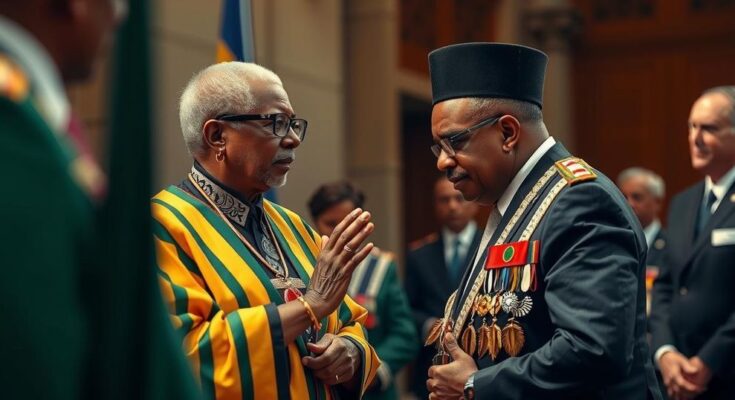Botswana’s new president, Duma Boko, was inaugurated after a historic election that ended the 60-year rule of the BDP. Boko pledged significant reforms, including raising the minimum wage and introducing universal health insurance, while the former president, Mokgweetsi Masisi, conceded defeat. The election signals a hopeful shift in Botswana’s political landscape, driven by public demand for change and improved governance.
On Friday, Botswana witnessed a significant political transition with the inauguration of its new president, Duma Boko, a human rights lawyer, after a historic election that culminated in the ousting of the Botswana Democratic Party (BDP) which had retained power for nearly six decades. Boko, who had diligently campaigned against the BDP, was sworn in during a closed ceremony led by the chief justice only three days post-election. In his acceptance address, he pledged to raise the minimum wage and establish universal health insurance, as well as to bolster investor confidence and diversify the economy, which heavily relies on diamond revenue. The former president, Mokgweetsi Masisi, conceded defeat, acknowledging the need for a transparent transition process after the election results revealed that his party could not secure sufficient parliamentary seats. Boko heralded the transfer of power as a testament to Botswana’s democratic principles, noting that it exemplifies a successful and peaceful regime transition witnessed by the citizenry. This election, marked by high unemployment rates and recent allegations of governmental corruption, prompted voters to seek change from the BDP’s long-standing leadership. Boko expressed a desire to foster a new era in Botswana, emphasizing the hope and expectations for improved governance. Citizens reacted with enthusiasm, highlighting their yearning for a responsive government capable of addressing pressing issues such as the rising cost of living and economic stagnation. The political landscape in Botswana is poised for transformation under Boko’s leadership, setting the stage for anticipated reforms and new policies that align with the electorate’s aspirations.
Botswana has historically been one of Africa’s stable democracies, but the recent election signifies a pivotal change in its political dynamics. The BDP, having dominated since gaining independence from British rule in 1966, faced significant public discontent, especially concerning issues like unemployment and corruption. The election and subsequent transition of power to Duma Boko and his newly formed party, the United Democratic Congress (UDC), reflect a critical juncture in the nation’s governance and the citizens’ demand for accountability and reform, particularly in a diamond-dependent economy.
The swearing-in of Duma Boko represents a watershed moment in Botswanan politics, characterized by a peaceful transition of power following a long tenure of the BDP. Boko’s proposed reforms and emphasis on better governance underscore a new direction embraced by the electorate. The success of his administration will largely depend on fulfilling campaign promises and effectively addressing the social and economic challenges confronting Botswana.
Original Source: www.wfxg.com




